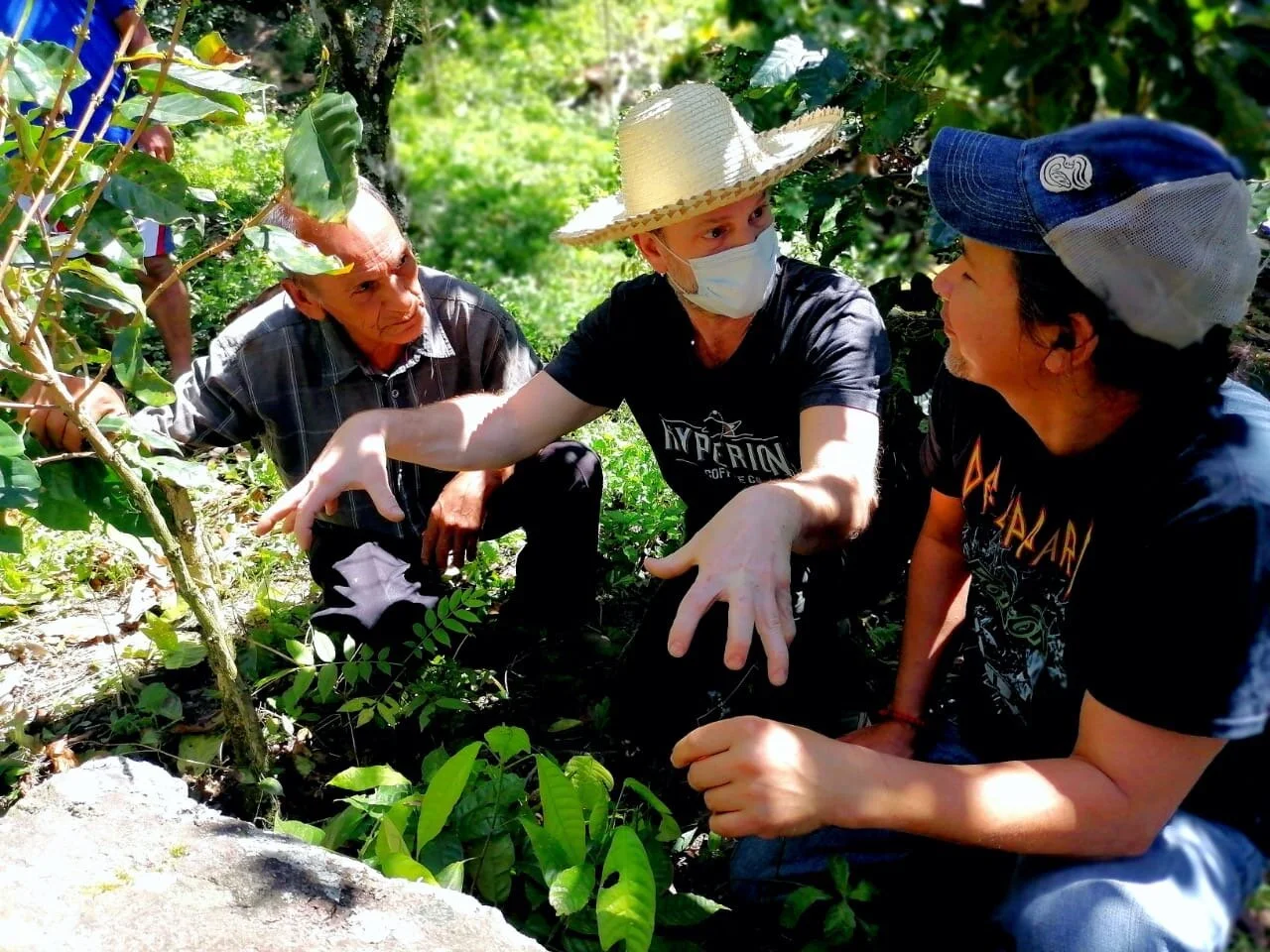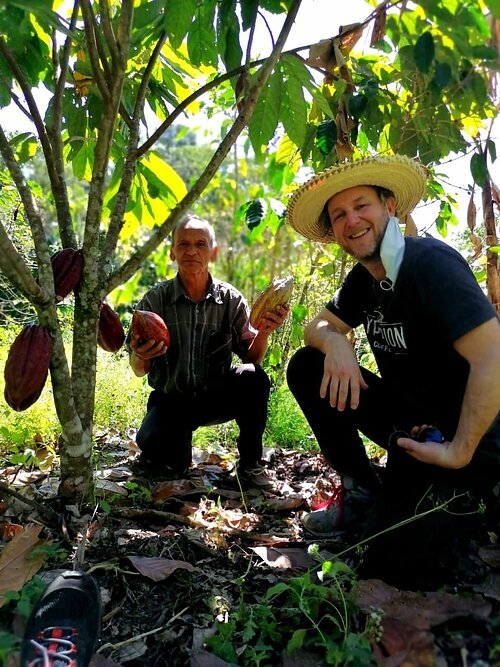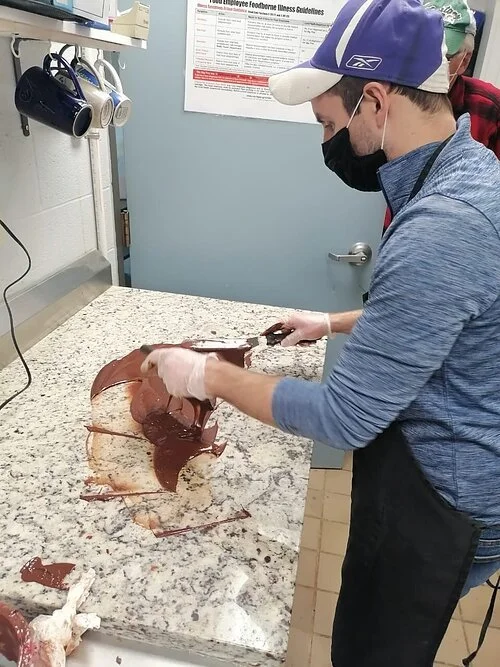The heart opening journey of a superfood in our backyard
FEBRUARY 11, 2021
[ Article ]
Juan, a cacao and coffee farmer, and Chad Morton outside of Comayagua, Honduras February 9, 2021
It’s close to Valentine’s Day and it is appropriate given the point in time we find ourselves in that what I am working on now is chocolate. Building on what I’ve learned up to this point as an entrepreneurial-focused co-founder and head of product at Roast Umber, we have developed a supply chain, production and product line.
First, let me say that my primary goal in life is to transfer wealth to the producers of the food and beverages that we love. The fact that pennies on the dollar for a specialty cup of coffee ever reach the good people that grow and produce it is wrong. Labels like "Fair trade" and other certifications leveled at the ethically-focused buyer or consumer are often created to raise the price of the final product while also placing higher demands on the producers.
After a decade of specialty third wave coffee becoming more common, how are those farmers doing? Is anyone listening, learning or partnering with them? In my opinion, from years of being in this area of the food industry, it is fitting to reference the old saying that the more things change, the more they stay the same.
It was while working on orphanages in Central America, I met some coffee producers who would support and challenge my curiosity. I bought products, formed relationships, and had to learn the valuable lesson of learning to listen to producers and understand my point of view was not as informed as I wished it was.
As a result of this journey, I went on to work with area coffee (or beverage) startups including EVO Coffee, Madcap Coffee, Direct Trade Coffee Club and now Roast Umber, where I am currently the co-founder and head of this new coffee product that launched in 2019. And what I’ve learned along the way is always evolving — I have remained passionate about the art of listening within one’s supply chain as I seek to find new opportunities for producers to reach a more global audience so I can continue supporting them.
As the pandemic has crushed the sales of our brick-and-mortar cafés, we’ve implemented a ‘Tip the Farmer’ function so that when you buy our coffee online you can share gratitude with a tip. What is pocket change here in the United States can have a major effect on the farm, which the producer, when receiving a gratuity, can use to help offset his operations and more easily adapt to opportunities and challenges as they arise.
I met Efren Maradiaga virtually through a connection from Elmer Cortes, second cousin to Pedro Cortes, the second farmer I ever worked with. Efren had samples of cacao to try and later, after working with what he had shared with me, he shared that out of everyone else he had reached out to connect with, that I was the only one to respond to him.
Roast Umber co-founder, Brad Gakenheimer, tempering refined chocolate for bar making at the commercial kitchen space (First Reformed Church) in Grand Haven
In Efren, I found a soulmate. Quality and passion for products blended with innovation, openness, and the ability to breakthrough how things are ‘supposed’ to be (and not what most experience with cacao has devolved to with cheap production and corners that get cut to maximize profit above all else). I had experience helping producers in my past ventures create more biodiversity through out-of-the-box thinking around items like honey, vanilla, and other products that could help offset the cost of selling a single farm product such as coffee. Efren introduced me to a product and from that moment a new and delicious journey that would help me in my next evolution would appear in the form of another bean: cacao.
Like many American farms, Efren inherited his father’s coffee farm in Comayagua, Honduras. It was latent and overgrown from years of underuse when he began thinking about what he should do when something finally hit him. And when I say hit him, it was a cacao bean tossed from a hungry squirrel's nibbling jaws high up in a tree far above Efren's head. From this discovery he created Atucún, a farm rebooted to harvest the native cacao trees, but also to educate and buildup his local community around the production of chocolate. From the gift of his cacao beans began a dialogue between the two of us that we still enjoy to this day.
From my hours of listening to Efren and subsequent readings on this key ingredient for chocolate production, cacao has a deep history in Mesoamerica that dates back thousands of years. Cacao was so ingrained in the culture that the beans were used as money for trade. The arrival of Conquistadors from Spain and the eventual destruction of the Indigenous people of Latin America, their culture, and regional identity would raise the platform of new globalized trade with control of this much sought-after agricultural item centered now within Europe.
Now with chocolate tied to European consumption (and production?), cacao became cash that traveled across the world to be consumed by the wealthy and well-connected.
With the arrival of the Industrial Revolution, came more and more refinement in the processing to create even more products including the proliferation of sweet desserts.
So powerful was the desire for this heaven-on-earth product that the Christian church even tried to ban it because they knew that people were buying it often because they felt it increased their inner carnal desires. Little did they know then that through science we know now, cacao is a superfood loaded with theobromine, tryptophan and phenylethylamine.
As Europe proceeded to expand their supply chains seeking to colonize Africa, they introduced a hearty theobroma cacao tree varietal there for a cheaper and more consistent supply. Cacao became less of a superfood and more candy-like to please the European tastes.
Ask anyone, from your neighbor to the chocolate shop owner in your town where their chocolate comes from and you’ll most likely receive the name of the store or the location of the company producing it and not the region of the world where it has indigenous roots as well as the most ideal climate for optimal benefits contained within this superfood.
Cacao is a complex food produced on an orchid tree. It produces a huge variety of products from vinegar, butter, powders, and has a variety of uses from skincare to paint. When we begin to understand the history handed to us and then begin to understand that cacao/chocolate does not come from Europe, we can begin to get to the root of the product in a "show me the trees" kind of moment that other farmed products enjoy.
For when we begin to untangle the centuries of supply chains that have hidden cacao's true roots and bloody history, then we can begin to restore its rightful power to the places it originated — as an indigenous superfood of the Americas, whereas mentioned before via its naturally occurring chemical composition. Native Mesoamerican varieties can deliver more than satisfaction for your sweet tooth as chocolate made from cacao can benefit your anxiety, depression and other microbial nutritional needs.
It is easy to see how when we do not take the time to question the supply chain much less the history and culture that has been white-washed into a product for centuries it is easy to see how we became so disconnected from the source. But with increased visibility and connection to one's supply chain, a topic growing more and more important to the consumer, it is important to add space within one's modern supply chain that is not just devoted to learning how to create — but to how unlearning is part of the modern mastery an entrepreneur must undertake moving forward.
When we started our company, Roast Umber, we took a different approach based on what I’ve learned throughout my career.
As businesses are all rethinking our supply chains, especially during this period of COVID-19 recovery, Efren is not my vendor. Rather, he is my co-worker and partner.
We had to build our own supply chain because it did not exist. Efren grows and sources Fino de Aroma cacao in Honduras and prepares it before being exported to the United States, arriving at a Michigan warehouse we share with another food producer, Kalamazoo's American Brewers. From there in keeping with our goals to support our local state's economy, we have begun producing in a certified kitchen at the First Reformed Church of Grand Haven who has long established its ties to Comayagua, Honduras through an orphanage. It is our hope in the months ahead as we begin to see more and more businesses begin to open more fully, that our tree-to-bar finished cacao products will be rolling out to support our area's food businesses just as we have seen happen with the many coffee brands I have launched in this region.
So why would any new startup in the middle of a global pandemic, which has turned the world of business on its head over the last year, even want to try and create a more open and transparent supply chain where you know that moments of deep listening and learning are not just required, but is truly necessary if we are to detangle the centuries' old thinking and colonist white supremacy tied to the product's de-evolution via the cheap ingredients that have watered down the origin story and cacao's power?
The answer is long term thinking and that we all are beginning to learn not just about innovation and new models of operation, but how we address the origin in a way that moves this powerful bean, just as coffee has, to the place where the producers and regions are more fully partners in the process and business. In this way, we have an opportunity to enjoy the benefits of our natural resources from top to bottom.
More and more today, we are all beginning to think outside of the box as we approach our businesses. The best I can share this month, in which stores have devoted aisles and aisles of bright red hearts packed with chocolate, is that listening is an excellent place to start when beginning to rebuild your supply chains. If you are able to start there, then maybe in the years ahead, we can enrich our local worlds while also helping others build their dreams, too.
Chad Morton is co-founder and Head of Product for Roast Umber and innovator for Atúcun and is joined in this work with Efren Maradiaga. www.roastumber.com & www.atucun.com



